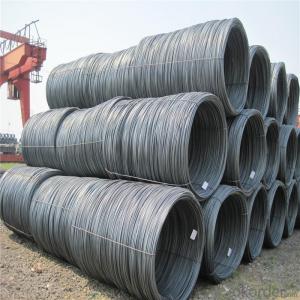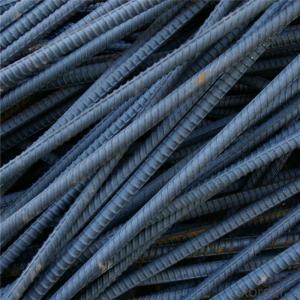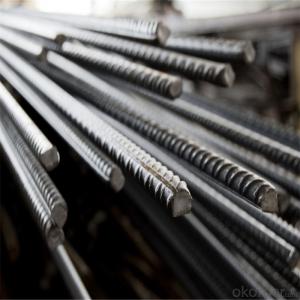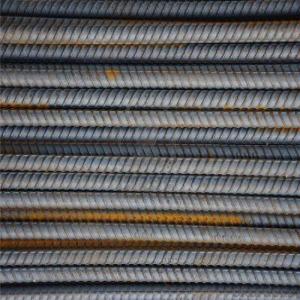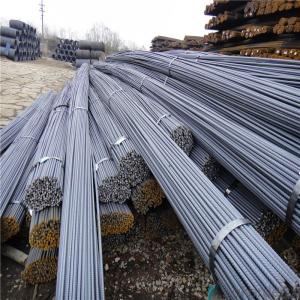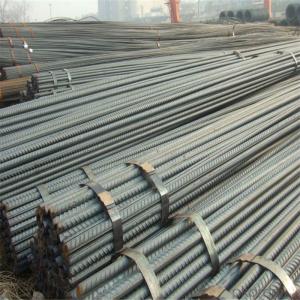Reinforcing Steel Rebar Bs4449 Grade 460B
- Loading Port:
- Tianjin
- Payment Terms:
- TT OR LC
- Min Order Qty:
- 130 m.t.
- Supply Capability:
- 500000 m.t./month
OKorder Service Pledge
OKorder Financial Service
You Might Also Like
Item specifice
Reinforcing Steel Rebar Bs4449 Grade 460B
Description of Reinforcing Steel Rebar Bs4449 Grade 460B
1, Diameter: 5.5mm-10mm Reinforcing Steel Rebar Bs4449 Grade 460B
10m- 40mm Reinforcing Steel Rebar Bs4449 Grade 460B
2, Length: 6m, 9m, 12m or customized
3, Standard: GB, ASTM, AISI, SAE, DIN, JIS, EN
OEM technology - send detailed technical parameters for accurate quotation.
2, Produce Process: smelt iron - EAF smelt billet - ESR smelt billet -
hot rolled or forged to get the steel round bar and plate
3, Heat Treatment: annealing, normalizing, tempering, quenching
4, Surface Treatment: Black
5, Quality Assurance: We accept third party inspection for all orders.
You can ask testing organizations such as SGS, BV, etc. to test our products before shipping.
Chemical Composition of Reinforcing Steel Rebar Bs4449 Grade 460B
Grade | Technical data of the original chemical composition(%) | |||||
Reinforcing steel bar HRB335 | C | Mn | Si | S | P | B |
≤0.25 | ≤1.60 | ≤0.80 | ≤0.045 | ≤0.045 | >0.0008 | |
Physics Capability | ||||||
Yield Strength(N/cm2) | Tensile Strength(N/cm2) | Elongation(%) | ||||
≥ 335 | ≥490 | ≥16 | ||||
Reinforcing steel bar HRB400 | C | Mn | Si | S | P | B |
≤0.25 | ≤0.16 | ≤0.80 | ≤0.045 | ≤0.045 | 0.04-0.12 | |
Physics Capability | ||||||
Yield Strength(N/cm2) | Tensile Strength(N/cm2) | Elongation(%) | ||||
≥ 400 | ≥ 570 | ≥ 14 | ||||
Products Show of Reinforcing Steel Rebar Bs4449 Grade 460B
Company Information
CNBM International Corporation is the most important trading platform of CNBM group.
Whith its advantages, CNBM International are mainly concentrate on Cement, Glass, Iron and Steel, Ceramics industries and devotes herself for supplying high qulity series of refractories as well as technical consultancies and logistics solutions.


F A Q
1, Your advantages?
professional products inquiry, products knowledge train (for agents), smooth goods delivery, excellent customer solution proposale
2, Test & Certificate?
SGS test is available, customer inspection before shipping is welcome, third party inspection is no problem
3, Factory or Trading Company?
CNBM is a trading company but we have so many protocol factories and CNBM works as a trading department of these factories. Also CNBM is the holding company of many factories.
4, Payment Terms?
30% TT as deposit and 70% before delivery.
Irrevocable L/C at sight.
5, Trading Terms?
EXW, FOB, CIF, FFR, CNF
6, After-sale Service?
CNBM provides the services and support you need for every step of our cooperation. We're the business partner you can trust.
For any problem, please kindly contact us at any your convenient time.
We'll reply you in our first priority within 24 hours.
- Q:What are the specific requirements for special steel used in the railway wheel industry?
- The specific requirements for special steel used in the railway wheel industry include high strength, durability, and resistance to wear and fatigue. The steel must have excellent mechanical properties to withstand heavy loads and impact forces. It should also have good heat treatment characteristics to ensure proper hardness and toughness. Additionally, the steel must meet strict dimensional and geometrical specifications to ensure compatibility with the railway system.
- Q:What are the environmental benefits of using special steel?
- Special steel, such as stainless steel, offers several environmental benefits. Firstly, it is highly durable and long-lasting, reducing the need for frequent replacements and minimizing waste generation. Additionally, special steel is corrosion-resistant, which reduces the use of toxic coatings or chemicals to protect against rust and degradation. Furthermore, the production of special steel requires less energy and emits fewer greenhouse gases compared to other materials like aluminum or plastic. Finally, special steel is recyclable, allowing for a closed-loop system where it can be repurposed and reused, further reducing the environmental impact. Overall, the use of special steel contributes to sustainability by conserving resources, reducing pollution, and promoting circular economy practices.
- Q:How does special steel contribute to the construction equipment industry?
- The construction equipment industry heavily relies on special steel to ensure the necessary strength, durability, and resistance to wear and tear in their heavy-duty equipment. Extreme conditions, including heavy loads, harsh environments, and constant use, demand the use of special steel alloys that are specifically designed to withstand these challenges and guarantee the equipment's longevity and reliability. One of the major contributions of special steel to the construction equipment industry lies in its impressive strength-to-weight ratio. This characteristic allows manufacturers to design and produce equipment that is both robust and lightweight. Implementing special steel in the construction of crucial equipment components such as chassis, booms, buckets, and blades enhances their load-carrying capacity and overall performance. Additionally, special steel offers exceptional corrosion resistance, which is a significant advantage in construction sites where equipment is exposed to moisture, chemicals, and other corrosive substances. By utilizing corrosion-resistant special steel alloys, manufacturers can extend the lifespan of construction equipment and reduce maintenance costs. Moreover, special steel plays a vital role in providing superior wear resistance. The abrasive materials encountered in construction sites, such as rocks, gravel, and concrete, can cause significant wear on equipment components. Special steel alloys with high hardness and wear resistance properties help minimize wear and prolong the service life of the equipment, reducing the need for frequent replacements and downtime. Furthermore, special steel enables the construction equipment industry to meet specific performance requirements. Various types of special steel alloys can be tailored to meet specific needs, such as impact resistance, high-temperature resistance, or low-temperature toughness. This versatility allows manufacturers to produce equipment that can efficiently operate in diverse conditions, ultimately enhancing the industry's overall productivity. In conclusion, special steel plays a crucial role in the construction equipment industry by providing the necessary strength, durability, resistance to wear and tear, and customization options. By incorporating special steel alloys into their manufacturing processes, equipment manufacturers can produce high-quality machinery that meets the demanding requirements of construction sites, thus improving productivity, safety, and efficiency within the industry.
- Q:Can special steel be used in high-pressure applications?
- Yes, special steel can indeed be used in high-pressure applications. Special steels, also known as alloy steels, are specifically designed to have enhanced mechanical properties such as high strength, ductility, and corrosion resistance. These properties make them suitable for withstanding high-pressure environments. Special steels are commonly used in industries such as oil and gas, aerospace, automotive, and power generation, where high-pressure applications are encountered. For example, in the oil and gas industry, special steels are used to manufacture high-pressure pipelines, valves, and pressure vessels that can withstand the extreme pressure conditions during oil drilling, transportation, and refining processes. The high strength of special steel allows it to withstand the internal pressure exerted by fluids or gases without deformation or failure. Additionally, its corrosion resistance properties ensure that the steel remains intact and free from damage caused by the harsh operating conditions often associated with high-pressure applications. Moreover, special steels can be tailored to meet specific requirements by adjusting their chemical composition and heat treatment processes. This customization allows the steel to exhibit even higher strength, toughness, and resistance to fatigue, making it ideal for applications involving high-pressure environments. In summary, special steel can be used in high-pressure applications due to its enhanced mechanical properties and corrosion resistance. Its ability to withstand extreme pressures makes it a reliable choice for various industries where high-pressure conditions are encountered.
- Q:What are the main applications of special steel in the mining equipment?
- Special steel is widely used in mining equipment due to its high strength, durability, and resistance to corrosion. It is primarily used for components such as drill bits, cutting edges, crushers, conveyor systems, and buckets. The superior properties of special steel enable these mining equipment to withstand harsh operating conditions and enhance overall productivity and efficiency in the mining industry.
- Q:What are the common applications of special steel in the manufacturing industry?
- Special steel is commonly used in the manufacturing industry for a variety of applications including the production of tools, machinery parts, automotive components, construction materials, and aerospace equipment. Its high strength, durability, corrosion resistance, and heat resistance make it ideal for demanding environments and critical applications where regular steel may not suffice.
- Q:What are the advantages of using special steel in the marine sector?
- Special steel has several advantages when used in the marine sector. Firstly, special steel is highly resistant to corrosion, which is crucial in a marine environment where constant exposure to saltwater can cause regular steel to rust and deteriorate. This corrosion resistance extends the lifespan of structures and components, reducing maintenance costs and increasing safety. Secondly, special steel offers excellent strength and toughness, making it suitable for the demanding conditions of the marine sector. It can withstand high stress, impact, and vibration, ensuring the integrity of the structures even in rough seas or extreme weather conditions. Moreover, special steel can be fabricated into various shapes and sizes, allowing for customization and optimization of marine components. This versatility enables the production of lightweight yet robust structures, improving fuel efficiency, and reducing the overall weight of the vessel. Additionally, special steel can withstand low temperatures, making it suitable for marine applications in colder climates or polar regions. It retains its mechanical properties even in sub-zero temperatures, ensuring the safety and reliability of marine operations. In summary, the advantages of using special steel in the marine sector include corrosion resistance, high strength and toughness, versatility in fabrication, and low-temperature resistance. These qualities enhance the durability, safety, and efficiency of marine structures and components.
- Q:What are the requirements for special steel used in metalworking tools?
- Special steels used in metalworking tools require specific characteristics and qualities to ensure their effectiveness and durability in demanding applications. Some of the key requirements for special steel used in metalworking tools include: 1. High hardness: Special steels used in metalworking tools need to have a high hardness level to resist wear and deformation. This allows the tools to maintain their sharpness and cutting edge for extended periods, resulting in efficient and precise machining operations. 2. Excellent toughness: Metalworking tools are subjected to high impact and stress loads. Therefore, special steels used in these tools must possess excellent toughness to withstand the forces encountered during cutting, drilling, or shaping operations. This toughness prevents the tool from fracturing or chipping, ensuring a longer tool life. 3. Good heat resistance: Metalworking processes generate significant heat due to friction, which can compromise the performance of the tool. Special steels used in metalworking tools should exhibit good heat resistance to minimize the risk of thermal damage, such as softening or loss of hardness, even at elevated temperatures. 4. Wear resistance: The ability to resist wear is crucial for metalworking tools as they are constantly in contact with the workpiece. Special steels used in these tools should have high wear resistance to maintain their cutting performance and dimensional accuracy over time. 5. Corrosion resistance: Metalworking tools are often exposed to harsh environments, including coolants, lubricants, and corrosive elements. Therefore, special steels used in metalworking tools should possess good corrosion resistance to prevent rusting and degradation, ensuring the longevity and reliability of the tools. 6. High dimensional stability: Special steels used in metalworking tools must exhibit high dimensional stability to ensure consistent performance. This stability allows the tools to maintain their shape and size under varying operating conditions, resulting in accurate and repeatable machining processes. 7. Machinability: Special steels used in metalworking tools should be machinable, meaning they can be easily processed and shaped into the desired tool design. This characteristic allows for cost-effective manufacturing, reducing production time and expenses. Meeting these requirements ensures that special steel used in metalworking tools is capable of withstanding the demanding conditions encountered in various metal fabrication and machining operations, providing efficient cutting, shaping, and drilling capabilities while maintaining longevity and performance.
- Q:What are the factors that affect the corrosion resistance of special steel?
- The factors that affect the corrosion resistance of special steel include the composition and content of alloying elements, surface finish and treatment, environmental conditions such as temperature, humidity, and exposure to chemicals, as well as the presence of protective coatings or inhibitors. Additionally, the manufacturing process and heat treatment can also influence the corrosion resistance of special steel.
- Q:How does case-hardening steel achieve high surface hardness?
- Case-hardening steel achieves high surface hardness through a process called carburizing or nitriding, where the steel is heated in the presence of carbon or nitrogen-rich substances. This allows carbon or nitrogen atoms to diffuse into the surface of the steel, creating a hardened outer layer while maintaining a tough and ductile core.
1. Manufacturer Overview |
|
|---|---|
| Location | |
| Year Established | |
| Annual Output Value | |
| Main Markets | |
| Company Certifications | |
2. Manufacturer Certificates |
|
|---|---|
| a) Certification Name | |
| Range | |
| Reference | |
| Validity Period | |
3. Manufacturer Capability |
|
|---|---|
| a)Trade Capacity | |
| Nearest Port | |
| Export Percentage | |
| No.of Employees in Trade Department | |
| Language Spoken: | |
| b)Factory Information | |
| Factory Size: | |
| No. of Production Lines | |
| Contract Manufacturing | |
| Product Price Range | |
Send your message to us
Reinforcing Steel Rebar Bs4449 Grade 460B
- Loading Port:
- Tianjin
- Payment Terms:
- TT OR LC
- Min Order Qty:
- 130 m.t.
- Supply Capability:
- 500000 m.t./month
OKorder Service Pledge
OKorder Financial Service
Similar products
New products
Hot products
Related keywords
